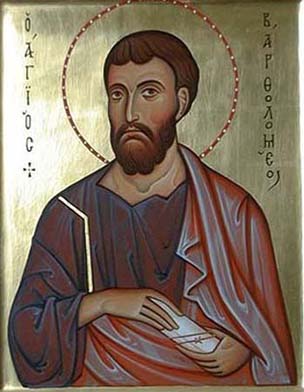
The Holy Apostle Bartholomew
Commemorated on June 11
The Holy Apostle
Bartholomew was born at Cana of Galilee and was one of the Twelve Apostles
of Christ. After the Descent of the Holy Spirit on the Day of Pentecost, it
fell by lot to the holy Apostles Bartholomew and Philip (Comm. 14 November) to
preach the Gospel in Syria and Asia Minor. In their preaching they dispersed
through various cities, and then met up together again. Accompanying the holy
Apostle Philip was his sister, the holy virgin Saint Mariam.Traversing the
cities of Syria and Myzia, they underwent much hardship and tribulations, they
were stoned and they were locked up in prison. In one of the villages they met
up with the Apostle John the Theologian, and together they set off to Phrygia.
In the city of Hieropolis by the power of their prayers they destroyed an
enormous viper, which the pagans worshipped as a god. The holy Apostles
Bartholomew and Philip with his sister proved their preaching with many a
miraculous sign.
At Hieropolis there
lived a man by the name of Stakhios, who had been blind for 40 years. When he
received healing, he then believed in Christ and was baptised. News of this
spread throughout the city, and a multitude of the people thronged to the house
where the apostles were staying. The sick and those beset by demons were
released from their infirmities, and many were baptised. The city governor gave
orders to arrest the preachers and throw them in prison, and to burn down the
house of Stakhios. At the trial pagan priests came forth with the complaint,
that the strangers were turning people away from the worship of the ancestral
gods. Thinking that perhaps some sort of magic power was hidden away in the
clothes of the apostles, the governor gave orders to strip them. But Saint
Mariam began to seem like a fiery torch before their eyes, and none dared touch
her. They sentenced the saints to crucifixion. The Apostle Philip was raised up
on the cross upside down. But there then began an earthquake, and a fissure in
the earth swallowed up the governor of the city, together with the pagan
priests and many of the people. Others took fright and rushed to take down the
apostles from the crosses. Since the Apostle Bartholomew had not been put up
high, they managed to take him down quickly. The Apostle Philip however had
died. Making Stakhios the bishop of Hieropolis, the Apostle Bartholomew and
Blessed Mariam left the city and moved on.

Preaching the Word of
God, Mariam arrived in Likaoneia, where she peacefully died (Comm. 17
February). The Apostle Bartholomew set off to India, and there he translated
from Hebrew the Gospel of Matthew, and he converted many pagans to Christ. He
visited likewise Great Armenia (the country between the River Kura and the
upper stretches of the Tigrus and Euphrates Rivers), where he worked many a
miracle and healed the daughter of the emperor Polimios from the demons
afflicting her. The emperor in gratitude sent gifts to the apostle, who however
refused to accept them, saying that he sought only for the salvation of the
souls of mankind. Then Polimios together with the empress, their healed
daughter and many of those close to them accepted Baptism. And people from the
ten cities of Great Armenia followed their example. But through the intrigues
of the pagan priests, the Apostle Bartholomew was seized by the emperor brother
Astiag in the city of Al'ban (now the city of Baku), and crucified upside down.
But even from the cross he did not cease to proclaim the good news about Christ
the Saviour. Finally, on orders from Astiag, they flayed the skin from the
Apostle Bartholomew and cut off his head. Believers placed his remains in a
pewter coffin and buried him.
In about the year 508
the holy relics of the Apostle Bartholomew were transferred to Mesopotamia, to
the city of Dara. When the Persians seized the city in 574, Christians took the
relics of the Apostle Bartholomew with them when they fled to the shores of the
Black Sea. But since the enemy overtook them there, they were compelled to
leave the coffin at the sea. By the power of God the coffin miraculously
arrived on the island of Lipara. In the IX Century, after the taking of the
island by the Arabs, the holy relics were transferred to the Neapolitan city of
Beneventum in Italy, and in the X Century part of the relics were transferred
to Rome.
There is mention
about the holy Apostle Bartholomew in the Vita of Joseph the Melodist (+ 883,
Comm. 4 April). Having received from a certain man part of the relics of the
Apostle Bartholomew, the Monk Joseph conveyed them to his own monastery near
Constantinople, and he built a church in the name of the Apostle Bartholomew,
placing therein part of the relics. The Monk Joseph ardently desired to compile
a laudation in song in honour of the saint, and he fervently besought God to
grant him the ability to do so. On the feastday in memory of the Apostle
Bartholomew, the Monk Joseph caught sight of him at the altar. He beckoned to
Joseph and took the holy Gospel from the altar-table and pressed it to his
bosom with the words: "Bless thou the Lord, and let thine song delight the
world". And from that time the Monk Joseph began to write hymns and canons
and with them adorn not only the feastday of the Apostle Bartholomew, but also
the feastdays of many other saints, – compiling altogether about 300 canons.
Saints John Chrysostom, Cyril of Alexandria, Epiphanios of Cyprus and certain
other teachers of the Church regard the Apostle Bartholomew as being one and
the same person as Nathanael (Jn. 1: 45-51, 21: 2).
© 1996-2001 by translator Fr. S. Janos.